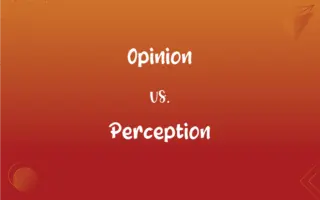Downtown vs. Uptown: What's the Difference?
Edited by Janet White || By Harlon Moss || Published on December 15, 2023
Downtown refers to the central business area of a city, often bustling with commerce and activity. Uptown typically denotes a residential area, often situated on the outskirts or higher part of a city.

Key Differences
Downtown is commonly understood as the heart of a city, characterized by a concentration of business, shopping, and entertainment facilities. Uptown, in contrast, is often associated with residential neighborhoods, sometimes perceived as more upscale or suburban in nature.
While downtown areas are bustling hubs for commerce and nightlife, uptown regions tend to be quieter, offering a more relaxed lifestyle. Both areas play distinct but complementary roles in the urban ecosystem.
The term downtown often implies a sense of urbanity and accessibility, being well-connected with public transportation. Uptown, on the other hand, may be situated away from the city center, emphasizing a sense of community and tranquility.
Architecturally, downtown areas usually feature high-rise buildings, offices, and apartments, reflecting their commercial focus. Uptown areas might be characterized by single-family homes, parks, and local schools, highlighting a residential atmosphere.
Historically, downtown has been the focal point for urban development and cultural landmarks, whereas uptown has evolved to accommodate residential growth and provide a counterbalance to the urban density of downtown areas.
ADVERTISEMENT
Comparison Chart
Location
City center
City outskirts or higher parts
Primary Function
Commercial and business hub
Residential and sometimes upscale
Building Types
High-rises, offices, apartments
Single-family homes, parks
Lifestyle
Bustling, urban
Quieter, suburban
Accessibility
Well-connected, public transport
Less central, more secluded
ADVERTISEMENT
Downtown and Uptown Definitions
Downtown
Heart of the city, often historic.
The downtown district is rich in history and architecture.
Uptown
Part of a city that is away from the commercial center.
She lives uptown, away from the hustle and bustle of the city.
Downtown
Central business district of a city.
The downtown area is bustling with shoppers and office workers during the day.
Uptown
Residential area, often outside city center.
Uptown is known for its quiet, tree-lined streets.
Downtown
Area known for commercial activity and entertainment.
Downtown is always lively with its array of theaters and restaurants.
Uptown
Suburban part of an urban area.
Uptown offers a more relaxed pace of life compared to downtown.
Downtown
Hub of urban life and culture.
Downtown hosts several art galleries and music venues.
Uptown
Area often situated on higher ground.
The uptown region offers stunning views of the city skyline.
Downtown
Location with high concentration of businesses.
Most of the city's major corporations are headquartered downtown.
Uptown
Neighborhood perceived as upscale or affluent.
Uptown is home to some of the most luxurious apartments in the city.
Downtown
The lower part or the business center of a city or town.
Uptown
The upper part of a town or city.
Downtown
To, toward, or in the lower part or the business center of a city or town.
Uptown
To, toward, or in the upper part of a town or city.
Uptown
Of, relating to, or located uptown.
Uptown
The residential part of a city, away from the commercial center
Uptown
In the upper part of a town.
Uptown
Of or relating to an affluent area or population.
Uptown problems
Uptown
To or in the upper part of a town.
Let's go uptown and try out that new restaurant.
Uptown
To or in the upper part of a town; as, to go uptown.
Uptown
Situated in, or belonging to, the upper part of a town or city; as, a uptown street, shop, etc.; uptown society.
Uptown
A residential part of town away from the central commercial district
Uptown
Of or located in the upper part of a town;
Uptown residential areas
Uptown
Toward or in the upper part of town
FAQs
Do uptown areas offer more green spaces?
Yes, uptown often has more parks and green areas.
Is public transportation more prevalent downtown or uptown?
Downtown typically has better public transportation options.
What is downtown known for?
Downtown is known for its commercial activities, offices, and entertainment options.
Are uptown areas typically quiet?
Yes, uptown areas are generally quieter and more residential.
Is downtown usually the historic part of a city?
Yes, downtown areas often have historical significance.
Are downtown areas more crowded?
Generally, downtown areas are busier and more crowded.
Is the cost of living higher downtown or uptown?
It varies, but downtown can be more expensive due to its central location.
Does uptown imply a higher social status?
Uptown can sometimes be associated with a more upscale or affluent lifestyle.
Are uptown neighborhoods older or newer?
This varies, but uptown areas can be both historic and newly developed.
Is nightlife more vibrant downtown or uptown?
Nightlife is typically more vibrant and diverse downtown.
Are there more cultural attractions downtown or uptown?
Downtown typically has more cultural and entertainment attractions.
Are restaurants more diverse downtown or uptown?
Downtown usually offers a more diverse range of restaurants.
Is downtown more tourist-friendly?
Downtown is often more geared towards tourists with its attractions.
Do uptown areas offer more privacy?
Generally, yes, due to their residential and less dense nature.
Do uptown and downtown differ architecturally?
Yes, downtown often has high-rises, while uptown may have single-family homes.
Is uptown considered more family-friendly?
Often yes, due to its residential and quieter nature.
Can you find major shopping centers downtown?
Yes, major shopping centers are often located downtown.
Is it common to find universities uptown?
It depends on the city, but universities can be located in either area.
Do uptown areas have a slower pace of life?
Yes, uptown is typically more relaxed and less hectic than downtown.
Is it easier to commute from downtown or uptown?
Downtown is often easier for commuting due to better transportation links.
About Author
Written by
Harlon MossHarlon is a seasoned quality moderator and accomplished content writer for Difference Wiki. An alumnus of the prestigious University of California, he earned his degree in Computer Science. Leveraging his academic background, Harlon brings a meticulous and informed perspective to his work, ensuring content accuracy and excellence.
Edited by
Janet WhiteJanet White has been an esteemed writer and blogger for Difference Wiki. Holding a Master's degree in Science and Medical Journalism from the prestigious Boston University, she has consistently demonstrated her expertise and passion for her field. When she's not immersed in her work, Janet relishes her time exercising, delving into a good book, and cherishing moments with friends and family.






































































